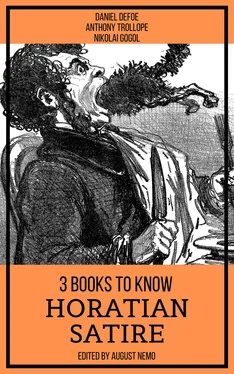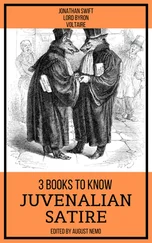There are not stars enough in heaven.
G.J.
BIGAMY, n. A mistake in taste for which the wisdom of the future will adjudge a punishment called trigamy.
BIGOT, n. One who is obstinately and zealously attached to an opinion that you do not entertain.
BILLINGSGATE, n. The invective of an opponent.
BIRTH, n. The first and direst of all disasters. As to the nature of it there appears to be no uniformity. Castor and Pollux were born from the egg. Pallas came out of a skull. Galatea was once a block of stone. Peresilis, who wrote in the tenth century, avers that he grew up out of the ground where a priest had spilled holy water. It is known that Arimaxus was derived from a hole in the earth, made by a stroke of lightning. Leucomedon was the son of a cavern in Mount Aetna, and I have myself seen a man come out of a wine cellar.
BLACKGUARD, n. A man whose qualities, prepared for display like a box of berries in a market—the fine ones on top—have been opened on the wrong side. An inverted gentleman.
BLANK-VERSE, n. Unrhymed iambic pentameters—the most difficult kind of English verse to write acceptably; a kind, therefore, much affected by those who cannot acceptably write any kind.
BODY-SNATCHER, n. A robber of grave-worms. One who supplies the young physicians with that with which the old physicians have supplied the undertaker. The hyena.
"One night," a doctor said, "last fall,
I and my comrades, four in all,
When visiting a graveyard stood
Within the shadow of a wall.
"While waiting for the moon to sink
We saw a wild hyena slink
About a new-made grave, and then
Begin to excavate its brink!
"Shocked by the horrid act, we made
A sally from our ambuscade,
And, falling on the unholy beast,
Dispatched him with a pick and spade."
Bettel K. Jhones
BONDSMAN, n. A fool who, having property of his own, undertakes to become responsible for that entrusted to another to a third.
Philippe of Orleans wishing to appoint one of his favorites, a dissolute nobleman, to a high office, asked him what security he would be able to give. "I need no bondsmen," he replied, "for I can give you my word of honor." "And pray what may be the value of that?" inquired the amused Regent. "Monsieur, it is worth its weight in gold."
BORE, n. A person who talks when you wish him to listen.
BOTANY, n. The science of vegetables—those that are not good to eat, as well as those that are. It deals largely with their flowers, which are commonly badly designed, inartistic in color, and ill-smelling.
BOTTLE-NOSED, adj. Having a nose created in the image of its maker.
BOUNDARY, n. In political geography, an imaginary line between two nations, separating the imaginary rights of one from the imaginary rights of the other.
BOUNTY, n. The liberality of one who has much, in permitting one who has nothing to get all that he can.
A single swallow, it is said, devours ten millions of insects
every year. The supplying of these insects I take to be a signal
instance of the Creator's bounty in providing for the lives of His
creatures.
Henry Ward Beecher
BRAHMA, n. He who created the Hindoos, who are preserved by Vishnu and destroyed by Siva—a rather neater division of labor than is found among the deities of some other nations. The Abracadabranese, for example, are created by Sin, maintained by Theft and destroyed by Folly. The priests of Brahma, like those of Abracadabranese, are holy and learned men who are never naughty.
O Brahma, thou rare old Divinity,
First Person of the Hindoo Trinity,
You sit there so calm and securely,
With feet folded up so demurely—
You're the First Person Singular, surely.
Polydore Smith
BRAIN, n. An apparatus with which we think what we think. That which distinguishes the man who is content to be something from the man who wishes to do something. A man of great wealth, or one who has been pitchforked into high station, has commonly such a headful of brain that his neighbors cannot keep their hats on. In our civilization, and under our republican form of government, brain is so highly honored that it is rewarded by exemption from the cares of office.
BRANDY, n. A cordial composed of one part thunder-and-lightning, one part remorse, two parts bloody murder, one part death-hell-and-the grave and four parts clarified Satan. Dose, a headful all the time. Brandy is said by Dr. Johnson to be the drink of heroes. Only a hero will venture to drink it.
BRIDE, n. A woman with a fine prospect of happiness behind her.
BRUTE, n. See HUSBAND.
––––––––

CAABA, n. A large stone presented by the archangel Gabriel to the patriarch Abraham, and preserved at Mecca. The patriarch had perhaps asked the archangel for bread.
CABBAGE, n. A familiar kitchen-garden vegetable about as large and wise as a man's head.
The cabbage is so called from Cabagius, a prince who on ascending the throne issued a decree appointing a High Council of Empire consisting of the members of his predecessor's Ministry and the cabbages in the royal garden. When any of his Majesty's measures of state policy miscarried conspicuously it was gravely announced that several members of the High Council had been beheaded, and his murmuring subjects were appeased.
CALAMITY, n. A more than commonly plain and unmistakable reminder that the affairs of this life are not of our own ordering. Calamities are of two kinds: misfortune to ourselves, and good fortune to others.
CALLOUS, adj. Gifted with great fortitude to bear the evils afflicting another.
When Zeno was told that one of his enemies was no more he was observed to be deeply moved. "What!" said one of his disciples, "you weep at the death of an enemy?" "Ah, 'tis true," replied the great Stoic; "but you should see me smile at the death of a friend."
CALUMNUS, n. A graduate of the School for Scandal.
CAMEL, n. A quadruped (the Splaypes humpidorsus) of great value to the show business. There are two kinds of camels—the camel proper and the camel improper. It is the latter that is always exhibited.
CANNIBAL, n. A gastronome of the old school who preserves the simple tastes and adheres to the natural diet of the pre-pork period.
CANNON, n. An instrument employed in the rectification of national boundaries.
CANONICALS, n. The motley worm by Jesters of the Court of Heaven.
CAPITAL, n. The seat of misgovernment. That which provides the fire, the pot, the dinner, the table and the knife and fork for the anarchist; the part of the repast that himself supplies is the disgrace before meat. Capital Punishment, a penalty regarding the justice and expediency of which many worthy persons—including all the assassins—entertain grave misgivings.
CARMELITE, n. A mendicant friar of the order of Mount Carmel.
As Death was a-rising out one day,
Across Mount Camel he took his way,
Where he met a mendicant monk,
Some three or four quarters drunk,
With a holy leer and a pious grin,
Ragged and fat and as saucy as sin,
Who held out his hands and cried:
"Give, give in Charity's name, I pray.
Give in the name of the Church. O give,
Give that her holy sons may live!"
And Death replied,
Smiling long and wide:
"I'll give, holy father, I'll give thee—a ride."
With a rattle and bang
Of his bones, he sprang
From his famous Pale Horse, with his spear;
By the neck and the foot
Seized the fellow, and put
Him astride with his face to the rear.
The Monarch laughed loud with a sound that fell
Читать дальше













